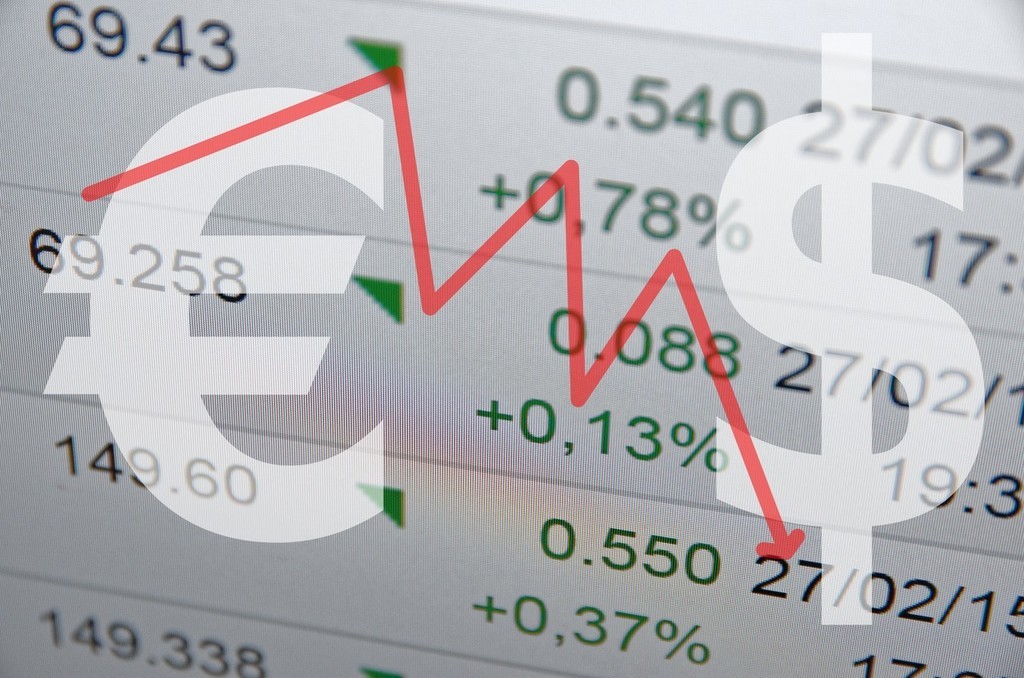European orders have declined, "Made in China" become expensive ... Listen to China -Europe companies about the impact of the euro depreciation
Author:Global Times Time:2022.07.19
[Global Times Reporter Zhao Juezhen Global Times Special Reporter Aoki in Germany] With the rapid depreciation of the euro recently and the US dollar exchange rate below the 1 to 1 mark, foreign trade companies at both ends of the Asia and Europe feel a lot of shocks. Foreign trade enterprises are the most direct market entities who have changed exchange rates. Relevant persons interviewed by the Global Times reporters said that the exchange rate changes bring more uncertainty to China -Europe trade. For Chinese companies, how does it change in orders from Europe? Is the purchasing power of European people declined? How do Chinese European companies reduce the risk of exchange rate fluctuations? "Global Times" reporters investigated this.

Picture source IC Photo
"European orders have fallen significantly"
On the 18th, the euro pairing RMB exchange rate was reported to RMB 6.81, which was almost the same as the US dollar exchange rate on the RMB. At the beginning of this year, the euro exchange rate was maintained at about 7.21 yuan to RMB. A number of Chinese foreign trade enterprises interviewed by a number of reporters from the Global Times reporters said that due to the depreciation of the euro and the weak economic growth of Europe, the order volume decreased significantly.
Mr. Qiu, the person in charge of a sanitary ware company in Wenzhou, Zhejiang, told the Global Times reporter that in April and May of this year, with the release of news such as the Federal Reserve ’s interest rate hikes, orders from abroad began to decrease significantly. "Most of our customers are in Europe. After the euro depreciates against the US dollar, the local purchasing power has also declined. Many customers have cut orders. A Spanish customer has notified this year's order demand by 20%." Mr. Qiu said, said that The biggest hope now is to have orders, "some companies are willing to do even if they lose money."
Li Ping, who feels the same as Mr. Qiu, also told the "Global Times" reporter that the number of orders for European exports this year has decreased to the Global Times reporter. Undertaking price increases. "Many European customers require the price reduction after placing an order, because the depreciation of the euro makes them stress very much." Li Ping said that as a small foreign trade dealer, they have no bargaining power. If the profit is too thin, they can only give up. There is no risk of exchange rate fluctuations, transportation and other aspects. "
In fact, for domestic foreign trade companies, the rapid fluctuations in exchange rates are a risk in itself. Since the beginning of this year, in addition to the rapid depreciation of currencies such as the euro and the yen, the exchange rate of the RMB to the US dollar has also fallen by about 5%in the second half of this year.
A person in charge of a state -owned enterprise engaged in commodity trade told the Global Times reporter that due to changes in the exchange rate since this year, the importance of financial instruments has increased significantly, and the company will analyze the currency trend and product trend every week. "Or" locking "to reduce risks, and these have increased the capital pressure of the enterprise.
The so -called "set insurance" means that the foreign exchange exchange rate is preserved ", which means that the use of foreign exchange futures transactions to ensure the loss of the value of foreign currency assets or foreign currency liabilities. The "locking" is an agreement with the bank. On the day of the settlement of the foreign exchange settlement, it was not based on the foreign exchange brand price of the day, but the exchange rate was settled at the previously determined exchange rate.
The person in charge of the above -mentioned state -owned enterprise said that, as the euro exchange rate against the US dollar has fallen sharply in the near future, every time the Fed's release of messages will cause market fluctuations. "For traders with stable demand, it is not a good thing to make a decision on the Federal Reserve. We look forward to it. It is a stable market. "
European Enterprise: "Made in China" is getting more and more expensive
Just as exporters in China have suffered from orders from Europe, importers in Europe have also increased their headaches for the "Made in China" by the depreciation of the euro. You Dan, who operates a home e -mall in Hamburg, Germany, told the Global Times reporter that taking a 300 -euro TV in China as an example, consumers now need to pay more than 50 euros.
You Dan said that in recent years, China ’s home appliances have become more and more popular, and brands such as Huawei, Xiaomi, Haier, Hisense have been well -known among German consumers. Since the epidemic of new coronary pneumonia, Chinese home appliances have often been out of stock. You Dan said that the depreciation of the euro is certainly not good news for pure salespersons like them. In particular, the current German prices are high, and consumers will reduce the purchase of non -urgent needed goods, and electrical appliances are often delayed or canceled.
"The impact of the depreciation of the euro on the China -Europe Trade is also great." Rudig, the head of the import and export trading company in Germany, told the Global Times reporter that a few months ago, the euro had depreciated to 1 euro to 7 yuan for RMB 7 yuan. Afterwards, it has rebounded, and it has fallen to about 1 euro at about 6.8 yuan, which affects Germany's import of "Made in China", but it is a good thing for Chinese consumers.
Rudiger made an analogy. For example, the export price of a bottle of German Ramen wine was 3.5 euros, which was still equivalent to RMB 25.2 a few weeks ago. Now it becomes 23.7 yuan, and Chinese customers can save 1.5 yuan. Rudig said that his business will be adjusted according to the exchange rate. When the euro depreciates, it will increase its exports to China; when the euro appreciates, the import of "Made in China" will be increased.
However, Yu Dan also mentioned to reporters that while the euro depreciation, the current China's container transportation costs have been greatly reduced. At present, the price of a 40 -foot container from Shanghai to Hamburg has dropped below 7,000 euros. In contrast, the price in the second half of last year exceeded 10,000 euros, which allowed importers in Europe to maintain some products without price increases. Of course, factors affecting China -Europe trade are not just changes in exchange rates. According to data released by the General Administration of Customs, the total import and export of China's imports and exports to the EU reached 2.71 trillion yuan in the first half of this year, an increase of 7.5%. The news released by the National Railway Group also shows that from January to June of this year, the China -Europe trains have cumulatively opened a total of 7473 columns, sending 720,000 standard boxes, an increase of 2%and 2.6%year -on -year, and the comprehensive heavy box rate reached 98%. The Global Times reporter also learned from the Yuxin European Company, one of the operators of China -Europe trains, that because the shipping cost of the China -Europe train is mainly settled in the US dollar, it has not seen a significant impact.
The euro may continue to depreciate
Agence France -Presse said on the 18th that due to high inflation and economic downturn, the European Central Bank will announce the first interest rate hike since 2011. Analysts of Berranberg Bank in Germany recently reported that "the exchange rate of the euro to the US dollar is in a state of free landing, and it is still not visible to the bottom." Analysts said that market participants' euro exchange rate price target is between 0.98 and 0.90 Essence
Liang Haiming, Dean of the Silk Road Zhigu Research Institute, told the Global Times reporter that if the economic recovery of the euro zone will be stagnated in the future, the Russian and Ukraine conflict leads to the shortage of energy, and the inflation is increasingly improved. The high import price does not rule out that the European Central Bank will eventually adopt a stronger policy to cope with the greater depreciation of the euro. However, Liang Haiming also emphasized that unless the European Central Bank raised interest rates harder than the Fed, and the Fed ended at the same time ending the super "eagle" monetary policy, the euro was more difficult to bottom out.
The market's expectations for the continued decline in the euro also means that domestic and foreign trade companies still need to prepare for problems such as changes in exchange rates and reduction in orders. Liang Haiming suggested that China -EU should further play the role of currency exchange, expand the scale of RMB and euro pricing and settlement, so that China -Europe bilateral trade and investment exempt people from third -party currencies (such as US dollars) for human exchange rate risk damage. According to the two -sided local currency exchange agreement that the People's Bank of China and the Central Bank of China renewed in 2019, the exchange scale of the two parties was 350 billion yuan/45 billion euros, and the agreement was valid for 3 years. According to the analysis, such a local currency exchange agreement allows China -Europe companies to use this part of funds directly for bilateral trade, avoiding the exchange rate risk of using third -party currencies.
- END -
Make honorary cards for retired party members and cadres

Concentrated his life into a small card, which is convenient and intuitive, and it...
Extremely reviews | How to crack the air conditioner of the "group"

Xu Hanxiong, a polar news commentatorRecently, a video of a video of a video of Un...